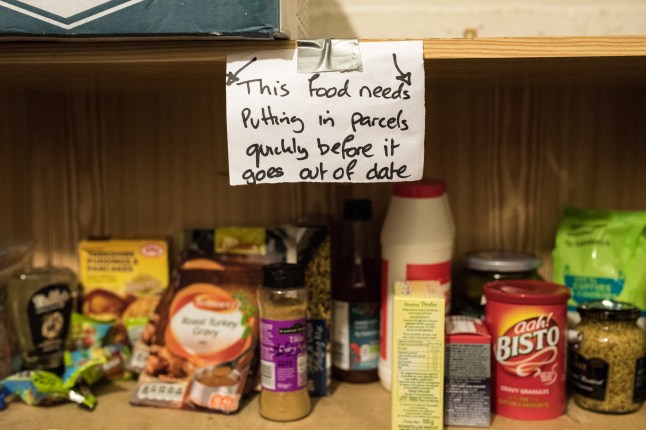
This year, Rebekah deSouza’s presents for her grandchildren will be a far cry from what many grandparents will be putting under the tree. At her house, insted of the latest must-have gadget or toy, the children will be unwrapping duvets and towels.
‘Other kids are getting things like PlayStation, but we can’t do that,’ the 63-year-old in Kent tells Metro. ‘We just can’t afford those things.’
Rebekah became the carer for her two grandchildren in January 2020, after her 31-year-old daughter Francesca died from an auto-immune condition.
‘We knew it was terminal, but we didn’t know it would happen that soon,’ she says.
Francesca and her children had already been living with Rebekah, but following her daughter’s death, shestarted the process of becoming the children’s guardian, otherwise known as a kinship carer – a relative or close friend of the child who steps up to care when their parents aren’t able to.
Although foster carers might receive both practical and financial support for such a role, kinship carers receive very little, if anything, and Rebekah has felt the impact over the past four years.
Although she gets benefits – £1,000 Universal Credit each month, Widows Benefit £190 per fortnight and a weekly Child Benefit of £89 – they barely cover the expense of running the family home, which is around £1,500 a month.

It means Rebekah has fallen behind with her council tax, often goes without heating if she can’t pay the bill and the family have to rely on foodbanks and school vouchers to make sure the children get fed.
‘We have debts, and I can’t pay them at the moment,’ Rebekah admits. ‘It means I have bailiffs knocking the door. It’s a big worry that they’re going to come in and take our stuff.’
Lucy Peake, from the charity Kinship, tells Metro that Christmas is one of the toughest times of the year for carers like Rebekah. ‘We know that most are worried about falling into debt to be able to afford to put food on the table and presents around the tree for their children,’ she explains.
‘For so many, Christmas dinner will depend on what they can find at the local foodbank.’

In a poll, the charity asked 1018 kinship carers about their financial concerns for the festive season. 80% said that the rising cost of living means they will spend less on Christmas this year compared to ‘normal’, while two thirds admitted they are worried about being able to afford Christmas presents for the children in their care this year.
Meanwhile, one in five think they will use food banks over the Christmas period, compared to 3% of the general population and almost half revealed that were likely or very likely to fall into debt to pay for Christmas this year.
Rebekah’s 34-year-old son has moved in with her to help with the children too. He and her 13-year-old grandson each get a bedroom, but Rebekah and her seven -year-old granddaughter sleep in the living room. ‘We sleep on the cuddle chair and the sofa,’ she says.
As Christmas gets closers, she’s getting increasingly worried about making it special for her grandchildren over the holiday season, especially as her teenage grandson often asks for things Rebekah knows she can’t provide.

Even so, she’ll try her best and aims to buy necessities with a bit of flare – an Elsa duvet instead of a plain one, for example. When it comes to festive food, Rebekah explains that she is depending on a food hamper from a church and food vouchers from the school for Christmas dinner. However, her oven hasn’t been working for months so she’s had to rely on a slow cooker and the hob, and isn’t sure she’ll be able to afford to get it fixed in time.
‘I might ask my neighbour if I can borrow hers for Christmas,’ Rebekah says bleakly.
The combination of ‘living on the breadline’ and dealing with the trauma of losing a daughter and mother has ‘taken a toll’, she adds. ‘But I’ve had to pull myself together to be fit enough to bring them up.
‘With the kids, I feel I have to do it [the big Christmas celebration] because otherwise, they’ll go to school and get picked on. I’m resilient and resourceful but it’s been a huge challenge. We’ve been flying by the seat of our pants, with no support or guidance or anything.

‘If we [as kinship careers] didn’t step up, the kids would be put in care and the Government would have to pay strangers to look after them. Why can’t they allocate that money to kinship carers to help us look after our children?’
It isn’t only at Christmas time that kinship carers like Rebekah struggle with finances. It’s all year long.
‘Kinship carers typically take on full financial responsibility for a relative or friend’s child unexpectedly after a crisis, unlike foster carers or adoptive parents who make an informed choice to care for a child when they feel in a secure financial position to do so, knowing they will be supported,’ Lucy explains.
‘This is made worse as there is no guaranteed financial support for most kinship carers, so they do not get the financial help they need to raise a child or children.’
Around two thirds of kinship carers are grandparents who have retired and more than eight in 10 told the charity they had to stop working permanently or reduce their hours after taking on the care of a child, plunging them into poverty and into the benefits system.
Fiona Logan became a carer to her four-month-old grandson in 2018 when her daughter could no longer look after him.

‘I was told that unless I applied for a Special Guardianship Order, he would stay in the care system,’ the 65-year-old in Christchurch, tells Metro.
When her grandson moved in, Fiona spent most of her salary to pay for childcare, and she soon realised she didn’t have ‘the headspace’ for her grandson when she was working.
‘I was a production planner for a manufacturer -it was quite a good job and well paid. But I wasn’t a superwoman. I had to give it up,’ she says.
However, leaving the workplace to look after her grandson was a a huge adjustment, Fiona discovered.
‘It was a shock to the system. I struggled with isolation. It was all too much,’ she admits.
Since then, Fiona has tried to ‘keep her head above water’ but feels the money situation keeps going ‘down and down’. When she stopped working, she also stopped paying into her pension – which will be her primary source of income as she ages. Thinking of her ‘tiny pension’ is often anxiety-inducing, says Fiona – so, for now, she can only think about one day at a time.

‘I’m really careful about everything I buy. I batch cook, because that is the cheapest way. I never buy new clothes for myself, and my grandson is a walking example of Primark,’ she explains.
Even so, every month, she drifts into her overdraft to pay for the basic necessities.
‘I try not to go too far into it, but sometimes I don’t have a choice,’ adds Fiona. ‘It makes me feel awful and embarrassed that I can’t afford to do what the other kids get to do.’
This Christmas, her grandson, now seven, has asked for a virtual reality headset. He doesn’t understand why he can’t have one.

‘Let’s put it this way: the joy has been sucked out of Christmas,’ admits Fiona. ‘It’s not a time of the year I look forward to. I dread it, because I feel I can’t give him what he’d like.’
For dinner, she hopes she’ll get ‘lucky’ enough to have money to pay for a chicken, but there won’t be any Christmas snacks or treats around the house.
‘It’s depressing,’ Fiona says of her financial circumstances. ‘I’m on antidepressants. It just seems like a never ending situation and no way to make it better no matter how much you try. I just wish the government would take us seriously and help us.
What charity says needs be done
The charity Kinship is calling on the government to step up and deliver financial allowances for kinship carers on a par with that for foster carers, recognising they are caring for children unexpectedly, delivering stable experiences and good outcomes for children within their family networks despite immeasurable personal cost to the kinship carers, and saving the taxpayer huge sums in the process.
Lucy Peake adds: ‘We also want the government to introduce a right to statutory pay and leave on a par with that for adoptive parents, so they don’t have to quit their jobs and sacrifice their incomes when they step up to care for children.’
For more information about Kinship charity click here.
‘I know I’m not alone. We all need to be recognised and helped, before we all crack.’
More Trending
A Department for Education spokesperson told Metro: ‘Kinship carers go above and beyond by stepping in for their loved ones during times of immense hardship, but we know that it is a life-changing decision and that many carers face vast emotional and financial challenges. We are determined to give them more support.
‘The government has inherited a children’s social care system in need of wholesale reform, and we know that kinship care has been overlooked for too long.
‘That’s why we’ve announced £40m to give kinship carers more help with the costs of supporting a child, and are introducing a new law to make sure councils set out clear support for local carers – breaking down barriers to opportunity for children across the country.’
Do you have a story you’d like to share? Get in touch by emailing Claie.Wilson@metro.co.uk
Share your views in the comments below.
MORE: Things get even more complex as someone drives Martin and Ruby together in EastEnders
MORE: Moment suspect is arrested after car ploughs through busy Christmas market
MORE: Child, 9, among five killed and more than 200 injured in German Christmas market attack













